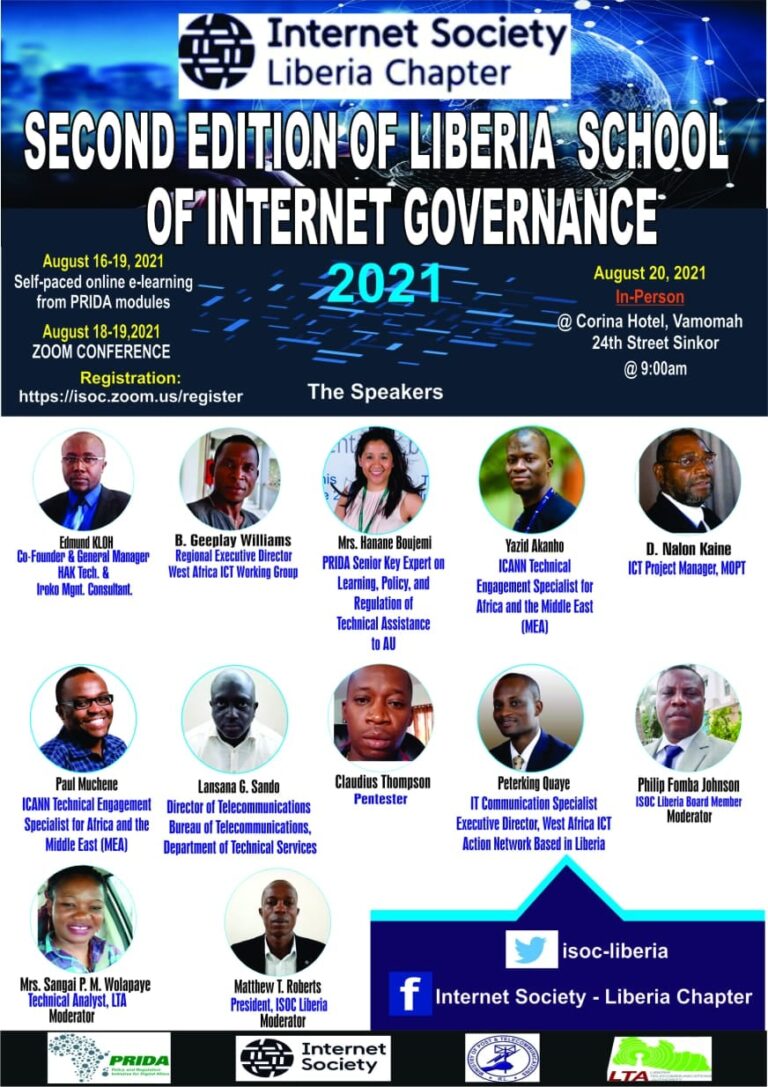
Liberia School of Internet Governance (LSIG) 2021
Invitation to Apply as a Fellow to the Second Edition of the Liberia School of Internet Governance (LSIG) taking place from
Time: August 9 -14, 2021.
Venue: Online via webinar and e-learning, and One day face-to-face at Corina hotel.
Introduction
Internet Society Liberia Chapter has since worked with other Internet and ICT stakeholders in Liberia to organize the Liberia Internet Governance School and Forum (LSIG/LIGF) that brings together local actors in ICT policy discussions. In response to a need for new voices, ISOC Liberia Chapter with support from the Internet Society Foundation small Grant partnered with Liberia Telecommunication Authority (LTA), Ministry of Post and Telecommunication of Liberia, AU Policy and Regulation Initiative for Digital Africa (PRIDA), and other stakeholders to organize the First edition of Liberia School of Internet governance (LSIG) 2020.
LSIG is now set to be among ISOC Liberia Chapter’s flagship programs, and its success has not been only in bringing in new voices but also in encouraging those whose work has been disrupted by the internet to understand and contribute to the internet policymaking processes. The goal of the School of Internet Governance is to ensure that diverse actors have the skills to participate in Internet governance structures and shape the future of the Internet.
ISOC Liberia Chapter is a multi-stakeholder body in Liberia for people and institutions interested and involved in Internet Advocacy, capacity development, and policy and regulation.
ISOC Liberia Chapter is opting to expand the horizon of the school bringing onboard Fellows from more diverse backgrounds and representation from all stakeholder groups. There will also be representation from underrepresented groups such as people working in rural Liberia, artists, and those working in applied ICT for example agriculture sectors. The faculty is sourced from local and African actors such as the regulators, the executive, civil society leaders, digital rights activists, lawyers, and the technical community.
ISOC Liberia has started consultative meetings with IGF focal person of Liberia, Ministry of Post and Telecommunication (MOPT), the National IGF Convener, LTA, West African Internet Governance Forum (WAIGF), and the AU Policy and Regulation Initiative for Digital Africa (PRIDA) to form collaboration and strategic alignment on the Liberia national IGF and LSIG. ISOC Liberia is working with other stakeholders to host the 3RD Liberia National Internet Governance forum after the LSIG.
Objectives
LSIG’s mission is to increase the capacity of key actors and potential actors in the local internet governance space. These include traditional human rights defenders and civil society organizations, students, academia, the tech community, and government departments. These actors are also commissioned to participate in international internet policymaking for thereby contributing African perspectives in global debates. The training aims to:
Get participants to understand internet governance.
Increase the mass of people contributing to internet policymaking in Liberia and globally.
Equip participants with skills to effectively participate in internet governance discussions and forums.
Provide networking opportunities for different stakeholders.
Provide actors involved in internet governance (trainers) with feedback on emerging issues.
Methodology
LSIG will take place over five days. During the training, participants are taken through basic concepts in internet governance with a focus on Liberia’s contribution throughout the years. Topical issues such as online protest and content generation, cybersecurity, encryption, digital rights, online marketing, artificial intelligence, digital economy, Key internet policy and regulatory issues and processes, Broadband and Wireless Networks, Critical Internet Infrastructure, data protection foundation, regulations, privacy & legislative approaches, governance approaches to moderate legal but objectionable content and the participants will interact with policymakers such as the Communications Authority, legislative drafters, and private sector policy advocates.
The training is a mix of lectures and interactive activities. Participants get to listen to perspectives from veterans and practitioners who have participated in internet governance as well as emerging leaders. They also get to stimulate scenarios and envision the future of the internet and policy-making in Africa.
Requirements
We are accepting fellowship applications from an interested individual. Only 30 fellows will be enrolled for this year Liberia school of Internet Governance (LSIG). Those selected fellows will enroll in the e-learning and complete the modules from PRIDA during the five days. Only those who completed the modules, passed the trial tests, and attended all the five days lectures, will be certificated. It is also required of each fellow to undertake an initiative within the respective community after completion for more engagements. The selection will go across to all stakeholder groups, but it will be based on basic knowledge in ICTs. Only selected fellows will be contacted. The two days webinar discussions will be opened to all participants along with the selected fellows. There will be no selection criteria for attending the webinar. The applicant to the webinar will only do registration for free to attend the zoom conference